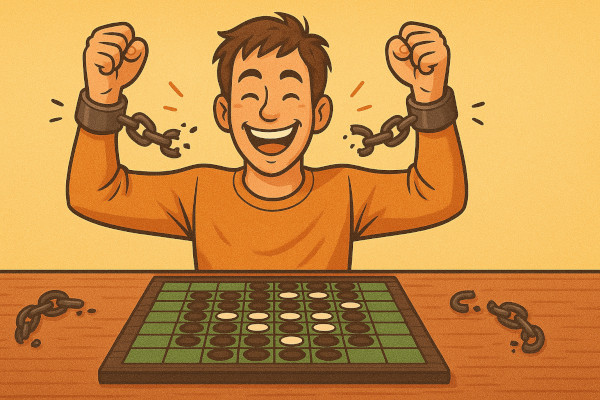Othello news
The Day I Escaped The Openings Prison
7 May 2025Written by Carlo Affatigato

Hey mom, look at me! I’m an adult now! I went through all the typical growth phases, had my tantrums, my teenage quirks, but now I feel like I can sit at the adults’ table. What did you say? I still have to stay with my cousins? But I want to exchange points of view with the uncles, I feel ready. I swear, I’m out of my opening addiction! I’ve been clean for over three weeks!
Yes, the logic behind openings in Othello is very much like a drug addiction. Knowing openings well can be a huge advantage, don’t get me wrong. Especially nowadays, with all the software available that makes it fast and easy to study the effectiveness of a move early in the game. You start playing Othello and the first thing you want to do is play as closely as possible to how a computer would. Which means always making the “right moves,” especially at the beginning. You get into it, maybe you realize you have a good memory and decent pattern recognition skills, and in a few months, you might end up knowing openings better than players with decades of experience. That excites you, because you realize that if you can bring those players into a balanced situation with 20 moves left, they only have a handful of chances to win that game. It's a real gamble for them, and it's up to them to get out of it, maybe risking a -6 somewhere midgame. I mean, without my obsession for openings, I wouldn’t have drawn against David Hand last February.
It’s all very nice. But then you realize that it’s a prison. And getting out of the opening-prison is really hard.
You realize you need to get out when you understand that this logic has limits. Alex Koh said that to me years ago, with typical Asian diplomacy: “If you keep going down that road, maybe one day you’ll be among the best in the world. But it’s a long road. And there might be a faster one...” It was too early then, I didn’t fully grasp the urgency of letting go of the one thing that gave me the most confidence in my gameplay. But people kept telling me. Matthias Berg threw it at me like a challenge, and since I like challenges, it worked. Then one day I went to Wroclaw to play against the strong Polish players, and Milosz Cupial explained to me why I lost: “I understood that you know openings very well, so I had to make a move that would throw you off, early enough to have time to recover the disadvantage, hoping you'd make a mistake. You know, I’ve been playing Othello for twenty years...”
So I understood that, in the end, it’s easy to dismantle the advantage of openings. I also realized that the more confident I feel with openings, the more self-esteem issues I have in the “free play,” being out of book. And damn it, I needed to find out if I have actual talent for Othello or if I’m only here thanks to memory and some shape recognition.
And so, my complicated relationship with openings led to the joy of playing XOT. Yeah, I know, many of you already figured this out, but bear with me, I’m only six years old (Othello-years, I mean). I’ve only just discovered this. Recently, there’s even been the chance to play 1-min XOT games on Othello Quest, and well, I don’t have many excuses left not to try. And to my pleasant surprise, I’ve found I’m not bad at all. I have my tools. I see things, like in a Shyamalan movie. I put experienced players in trouble. I even won the XOT tournament in Italy last month, against players who always give me a hard time in regular games. All those signs were telling me it was time to switch things up. I’ve started thinking about it more seriously, treating it like an analysis to complete. The real question at that point was: how much does my win-rate drop if instead of playing “my openings,” I throw out something crazy right away and we all play cheerfully out of book for the whole game?
I’m not going to give you the answer, but judging by my enthusiasm, you can probably guess. What I’ve realized is that playing a -8 on move six isn’t that different from following the openings you know and reaching move 45 at -4. If you are an experienced player, surviving the last fifteen moves might actually be easier than dealing with something unusual from the very start. And I know that before midgame, a computer would say I’m at a significant disadvantage. Who cares, I’m playing against a human anyway. So, the exact day I finished my opening rehab, well, I’m not quite sure when that was. But now I really feel free.
(Yeah, I know, I probably shouldn’t have publicly announced that I no longer play my classic openings. But whatever, go ahead, try to study me now that I’ve unlocked the awareness that I can come up with a new variant basically every week.)




